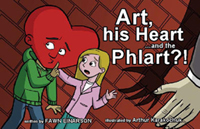| ________________
CM . . .
. Volume XXI Number 41. . . .June 26, 2015

 |
Art, his Heart...and the Phlart?!
Fawn Einarson. Illustrated by Arthur Karakochuk.
Saskatoon, SK: Hear My Heart Books, 2014.
32 pp., stapled pbk. & pdf, $12.00 (pbk.), $6.00 (pdf).
ISBN 978-0-9877251-5-8 (pbk.).
Grades 2-5 / Ages 7-10.
Review by Aileen Wortley.
* /4
|
| |
|

excerpt:
And so Art and the phlart met every day before AND after school. One day the phlart wanted to play a new game. Art said “Okay, but I’d rather skip.” They played a secret game that made Art feel bad. Art told the phlart he wasn’t having fun. He told the phlart the game made him feel uncomfortable.
Instead of being nice, the phlart got mad. “We played with the skipping rope 100 times. Now you have to play my game.”
“NO!” Art said. “I’m going to tell my mom!”
The phlart said, “If you tell your mom, I won’t be your best friend. I won’t hold the skipping rope for you anymore and I won’t give you candy.”
Art felt hurt. “I don’t care! I don’t want to be your friend anymore and I don’t want your stupid candy. Then the phlart got REALLY mad and said, “I will take you far away from your mom and you will never see her again.” Art felt scared. “My mom will find me. She used to be a girl scout.” Then the phlart got REALLY, REALLY mad. “If your mom finds out about our new game, she won’t love you anymore. Art felt ashamed, but he didn’t know why. He wanted to run, but his feet wouldn’t work.”
A lonely child with little confidence, Art yearns for friendship. When approached by a “phlart” with nefarious intentions, Art’s desire for a friend outweighs his awareness that he should be cautious about strangers. Each day the phlart meets Art to play his favourite game of skipping, plying him with candy and flattery. Art trusts him. Eventually the phlart reveals his true intentions when he wants to play “a secret game that made Art feel bad.” When Art is reluctant to repeat the game, the phlart belittles him, warning him that his mother will reject him if she knows about the game. Art feels guilty, angry and afraid, internalizing his pain. Eventually he finds a real friend who encourages him to seek help, and thus he begins to heal.
This diminutive book is intended to provide a shield to protect children from sexual abuse and help them heal if they have already experienced it. The story is introduced with advice, warnings and suggestions for adult readers should a child disclose during its reading that he has been abused or molested. It also contains help-line resources and agencies that would be of assistance to children and adults.
The illustrations are presented in a simple cartoon animation style with the pedophile depicted as a dark menacing shadow and Art’s mood reflected by the colours used. Perhaps due to the page size and the amount of text included, many pages seem overcrowded, and the overall layout is not appealing.
The book’s therapeutic intention is worthy, but pedophilia is a difficult subject to present in a way that will be meaningful to children but not frightening. Such a topic needs to be addressed clearly, simply and directly.
The story effectively reflects the roller-coaster of emotions that Art experiences - his loneliness, his dependence, his fears, his sense of guilt and the hurt that turns to emptiness. It also reflects the manner in which pedophiles inveigle their way stealthily and over a period of time into a child’s heart to gain her/his trust.
But in the author’s efforts to be sensitive and nonthreatening, she skirts important issues in a very belabored and indirect way to the point where the reality of sexual molestation becomes obscured in analogy and innuendo with words such as ‘phlart’ for pedophile, ‘secret games’ for inappropriate physicality, etc. In addition the use of rhyming names (Phlart, Art, Tart, Mr. Dart.) for the characters takes away from the seriousness of the topic.
While Art, his Heart…and the Phlart?! might be useful in the hands of a skilled social worker to use with students aged seven to ten, its effectiveness in other circumstances is limited.
Not Recommended.
Aileen Wortley is a retired librarian living in Toronto, ON.

To comment
on this title or this review, send mail to cm@umanitoba.ca.
Copyright © the Manitoba Library Association. Reproduction for personal
use is permitted only if this copyright notice is maintained. Any
other reproduction is prohibited without permission.
Next Review | Table of Contents For This Issue - June 26, 2015
CM Home | Back Issues
| Search
| CM Archive
| Profiles Archive
|
